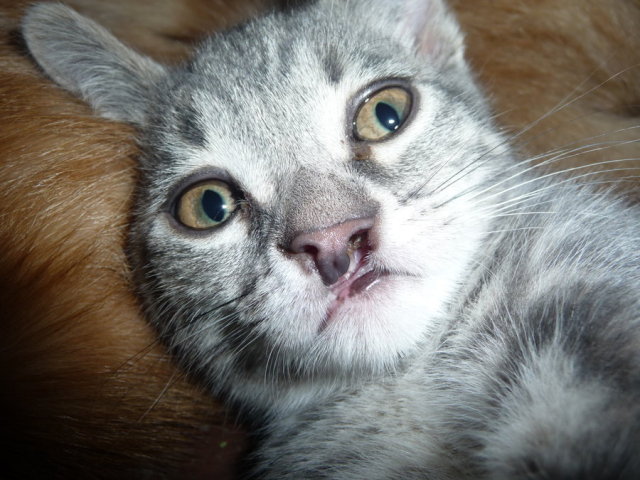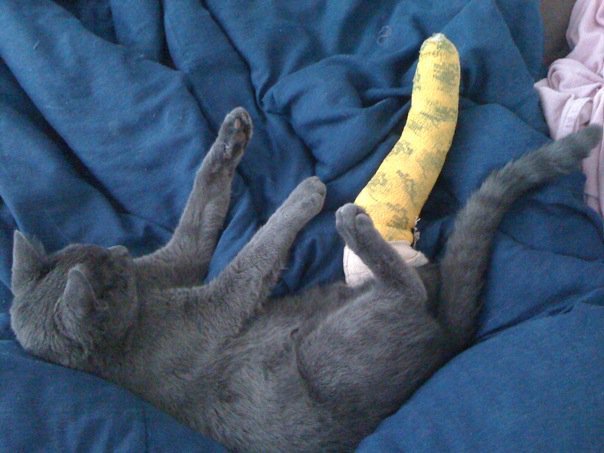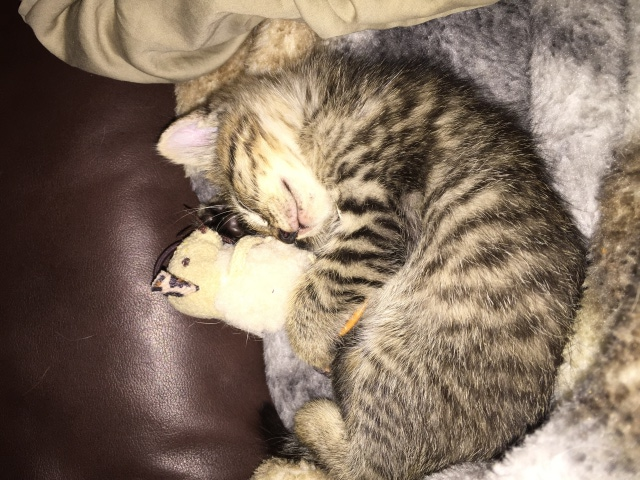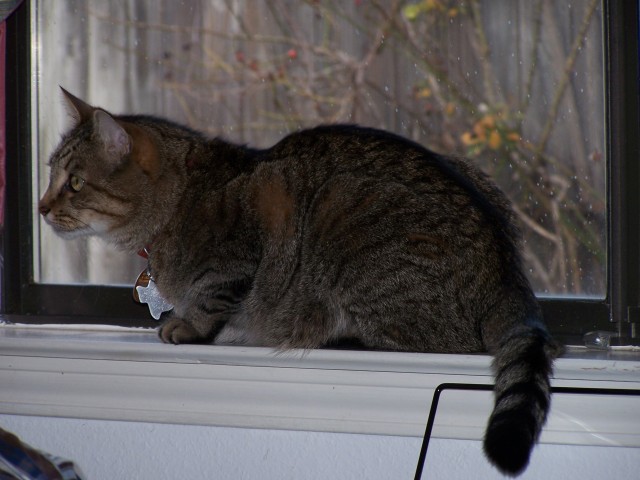QuestionMy polydactyl cat just had here first litter of kittens. She has had 3 I think she is done. The first kittens lived about 3 or 4 minutes the other to were still born they looked as if they were not fully developed. She did not have any problem having them accept she is hiding under my bed now. She started about 3 pm and had her last one about 8pm why would she have had them to early I want at least one litter from her and our polydactyl tom cat but I am afraid to put her through that again. What is the chances of it happening again? When I got her in January she had been severly mistreated she hid under my bed for 2 weeks now she comes out and plays with everyone. I had to shave her long hair because it was so matted could her previous treatment had something to do with it?
AnswerCristal,
It's very important to consider that there may be some underlying health issues which caused the queen to deliver prematurely. Premature kittens are often somewhat smaller than those born at full term, they can have little or no fur and breathing difficulties can cause death fairly rapidly after the kittens are born. Kittens who are born two weeks or more before their time aren't likely to survive for long, they just aren't ready to function in the outside world yet. Many times kittens born 6 or more days prematurely require tube feeding because their ability to suck isn't fully developed and they won't be able to take in enough nutrients to meet their needs.
Sometimes the reason for a queen to deliver her babies too early is related to medications she's been given, stress or even trauma. I wouldn't rule out the possibility that mom was in a somewhat run down condition when she came into your home which she hadn't recovered from when she became pregnant with her kittens. I can say with some degree of certainty that mom wasn't pregnant when she came into your home in January - the normal gestation period for cats is between 60-68 days which would have meant that mom became pregnant at some point in March if she's had kittens that were 14 days or more premature. If mom isn't accustomed to having her matted fur shaved off it could certainly have caused stress and it may have induced labor prematurely. Mom may have had a hormonal imbalance, she could also have had an ovarian cyst that caused the pregnancy to end. In some cases mother cats deliver their litter prematurely because their body just isn't able to handle the strain of maintaining a pregnancy until the little ones have reached term. It would be a good idea to have your tom and queen tested for feline leukemia as it's possible this has played a role in the premature delivery of the kittens. Female cats can become pregnant again shortly after delivering a litter of kittens so it's of the utmost importance to keep mom away from any intact male cats to avoid another pregnancy because this one has obviously been quite stressful and traumatic for her and it's not really fair to set her up for another tragic outcome by allowing her to get pregnant again.
Sometimes a change in behavior can indicate the presence of illness in cats, it's certainly worrying that mom is now spending her time hiding under the bed according to the information you've provided. Cats are very stoic animals and they often don't show signs of illness or injury which means that things can be substantially worse than they appear by the time that a cat does start to show signs that they may be ill. In this case I am very concerned about the potential for mom to have an infection since it sounds to me like she's exhibiting behavior that's different from her usual self. This change in behavior could mean that she's grieving the loss of her babies however there's a possibility that mom has an infection of some sort or somebody may have been left behind when the other kittens were born - the only way to know for sure that nothing is wrong is to have the vet assess mom as soon as possible. If mom has retained any placentas or products of conception she could develop some serious infections.
I really believe that it would be in mom's best interests to be spayed as soon as the vet can do so. It's best not to breed cats unless you are a professional breeder. At this point I would say that it's just not necessary to put mom through the trauma of another pregnancy and risking the possibility that she may have further complications with her next pregnancy, labor or delivery. There are just too many adoptable, healthy cats and kittens in shelters worldwide and all too many are euthanized each day simply because shelters don't have enough money, time or resources to keep each adoptable animal indefinitely until their forever family comes along to adopt them. Cats in shelters are sometimes abandoned there because their previous caregiver has discarded them which is disturbing considering that a pet shouldn't be viewed as a disposable item, a pet deserves a lifetime commitment from their caregiver.
Female cats can become pregnant very shortly after giving birth so it's best to keep mom indoors and away from any intact male cats to avoid further additions to a world where there are way more pets than there are good adoptive homes. There is a serious pet overpopulation crisis affecting shelters and rescue groups worldwide. Every single day animal lovers working for these organizations are forced to euthanize healthy, adoptable animals because there just isn't enough time, space or resources to keep all animals indefinitely while waiting for their forever families to come along. Spaying and neutering pets is an ethical choice that saves countless lives worldwide every year. Contrary to popular belief female cats don't need to have a litter of kittens in order to calm down enough to be good house pets. There are many good medical and behavioral reasons to spay and neuter cats.
Cats that have been spayed or neutered are prevented from developing uterine, ovarian or testicular cancer. The earlier in life that a cat is spayed or neutered the lower their risk is of developing breast or prostate cancer. Unspayed female cats are also at risk of developing a potentially fatal uterine infection called pyometra - this infection causes the uterus to fill with pus, if the womb ruptures spreading pus throughout the abdomen the chances of the cat surviving are pretty slim. The only treatment for pyometra is to perform an emergency spay, this surgery is riskier than a routine spay because the cat is quite sick, the spay is also much more complex so it takes more time and is usually far more expensive.
In North American cats the leading cause of death is euthanasia related to behavioral problems, this is a sad and easily changed statistic because many behavioral problems are preventable or significantly reduced by spaying or neutering our cats at a young age. Cats that have been spayed or neutered are far less likely to develop common behavioral issues like urinating or defecating outside of the litter box or home to mark their territory, they're also far less likely to be fighting with other neighborhood cats in an effort to protect their territory (medical expenses from treating abscesses and bite wounds caused by fighting can add up rather quickly). A female cat that has been spayed won't howl to advertise her availability to mate, a male cat that's been neutered won't caterwaul late at night in an effort to win the right to mate with a receptive female cat. Spaying and neutering also reduces some forms of aggression that are directed at human caregivers.
All in all ensuring that the cats you care for are spayed and neutered provides them with a less stressful life, they aren't consumed with mating and defending territory and many serious medical problems are prevented or the likelihood that they will occur is significantly reduced. Simply put spaying and neutering saves lives, it's the responsible and ethical choice to ensure that our pets live longer, healthier and happier lives.

 Cleft Lip
Question
Cleft Lip Kitty
Hi Ali,
I have a cat thats 11
Cleft Lip
Question
Cleft Lip Kitty
Hi Ali,
I have a cat thats 11
 Cats broken leg and aggression
Question
Little Scout
Hello, I wanted to pose a query t
Cats broken leg and aggression
Question
Little Scout
Hello, I wanted to pose a query t
 Found 4-5 week old kitten
Question
Chloe
Hi. We found a 4-5 week old kitte
Found 4-5 week old kitten
Question
Chloe
Hi. We found a 4-5 week old kitte
 The breed of my 5 1/2 month old kitten
Question
Edmund 5 1/2 months ol
Hi, my husband and I re
The breed of my 5 1/2 month old kitten
Question
Edmund 5 1/2 months ol
Hi, my husband and I re
 Cat gets angry at tail
Question
Rascal Rasputin
My indoor adult cat seems to g
Cat gets angry at tail
Question
Rascal Rasputin
My indoor adult cat seems to g